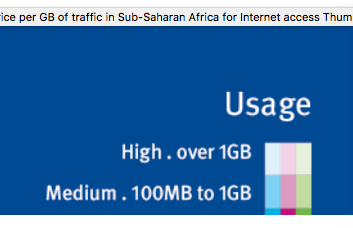Africa Highlights
- Infographic: History of the Internet in Africa
- Follow the African Peering and Interconnection Forum
- Read the report: Lifting the Barriers to Internet Development in Africa
Regional Context:

Download: Average price per GB of traffic in Sub-Saharan Africa |
Since the year 2000 Africa has been laying the groundwork to become a major player in today’s information age. In the past decade, online access has quadrupled and cell-phone usage has increased tenfold – making it one of the fasting growing regions in the online world.
While improved access to the Internet represents huge potential for Africa’s economic, political and cultural future, these numbers still only represent a fraction of Africa’s population.
Why should the world worry about this digital divide? Many economists think, with the right tools, this could be Africa’s century.
It’s becoming less and less of a well-kept secret that Africa is in the midst of a profound transformation. Since 2004 economic growth has grown steadily at 6%. Internationally the continent is also opening itself up to global and local trade, proving that even when most of the world is in a financial crisis, Africa can remain open for business.
Almost 15 years ago, experts at the Internet Society outlined how the Internet has a lot to offer emerging economies – everything from software and education, to boosting handicrafts and human rights. But without a progressive Internet environment, cyberspace will continue to exacerbate the digital divide between North and South, urban and rural, and English-speaking and non-English-speaking parts of the world.
Increased access to the Internet and the web also means political change. Africa rattled the walls of the online world when citizens of Tunisia and Egypt used the Internet as one of the main tools to challenge tradition and change the rules. We also saw a global outcry when a medium that fundamentally supports opportunity, empowerment, knowledge, growth, and freedom was taken away.
While social media is a fact of life for many of us, Africa was one of the first areas in the world where regular citizens, activists, nongovernmental organizations, and business people demonstrated the freedom of speech these online tools can give. It was, and is, history in the making.
By lending their voice to the online world, Africa will not only help bring its economic growth to a world in the midst of change but also its rich voice to a global tool that has been built for users, by users.
How We Work:
The Regional Bureau in Africa acts as an advisor to other Internet Society departments on issues affecting our work. Its also provides critical insight on local business, technology and policy issues to the Internet Society and its stakeholders.
The Bureau also work with Chapters to grow individual memberships, support their initiatives and help them advance in their support of the Internet Society’s mission and values. This includes the focus on building trust and providing transparent guidance for Chapters and helping each Chapter develop strong projects.
We Focus On:
Education – Through a number of programmes we help local communities, neighbourhoods, and villages build their skills to access and develop the Internet and the World Wide Web.
Cybersecurity – While improved access to the Internet is a great economic opportunity for Africa, it also means it is becoming increasingly vulnerable to threats such as viruses, hackers, and malicious spam.
Mobile – While Africa is one of the leading countries in terms of mobile Internet – access to the network that supports it (known as the Global System for Mobile Technology, or “GSM”) remains a challenge.
Cost – Africa has some of the highest prices in the world when it comes to online connection. Why? Many of its countries are simply not connected. This means if you lived in Accra, Ghana and wanted to send an e-mail to a friend in Nairobi, Kenya, your message might have to travel to France before it can make its way Kenya. This means higher costs and service that can be slow and unpredictable.
Policy – We work to help make sure public laws at the local, national, regional, and international level are developed to help support the development of an open and user defined Internet.